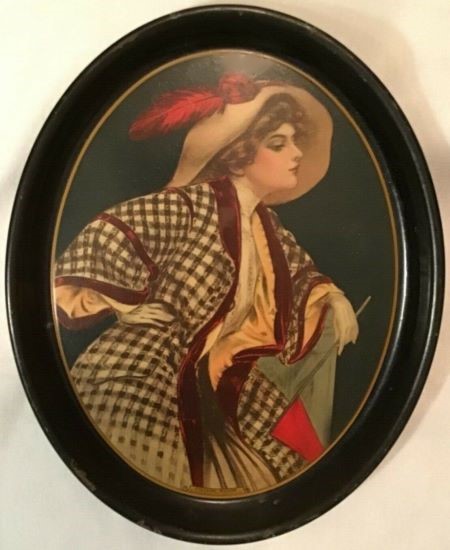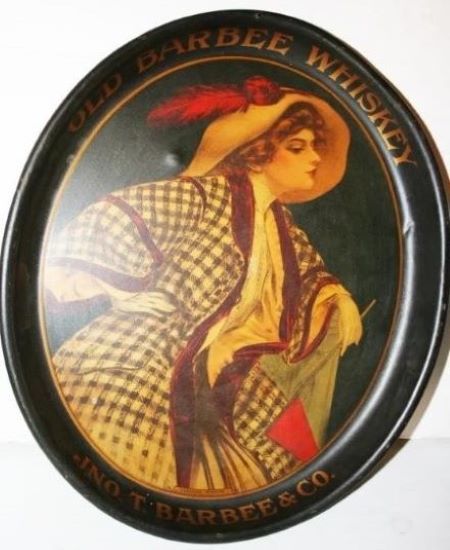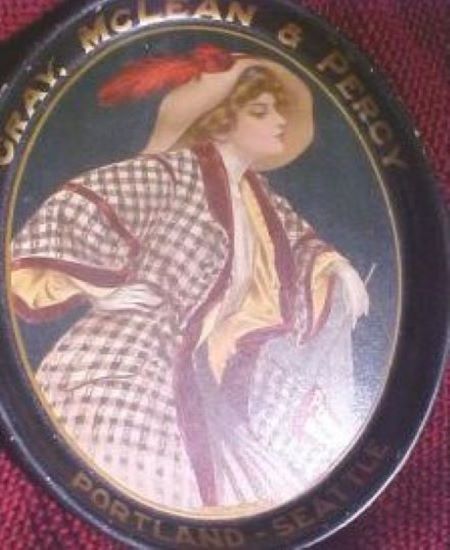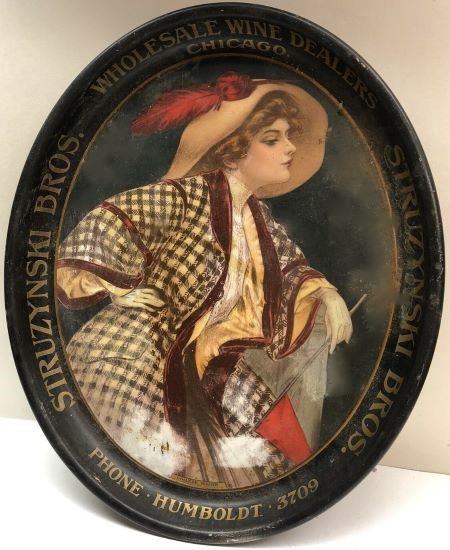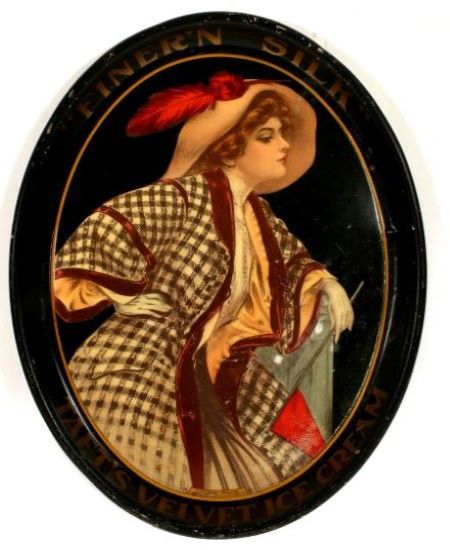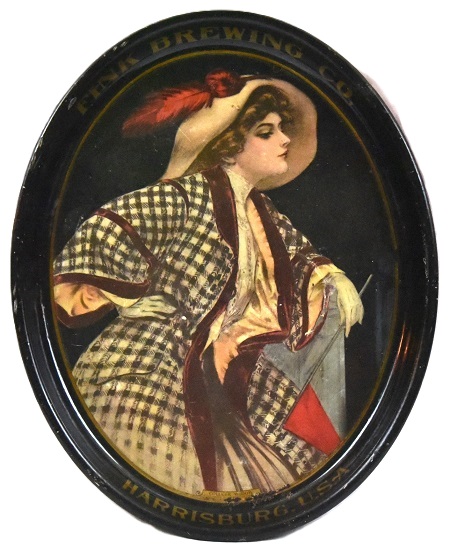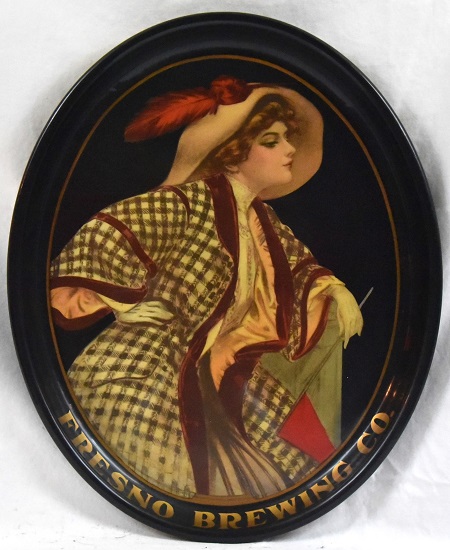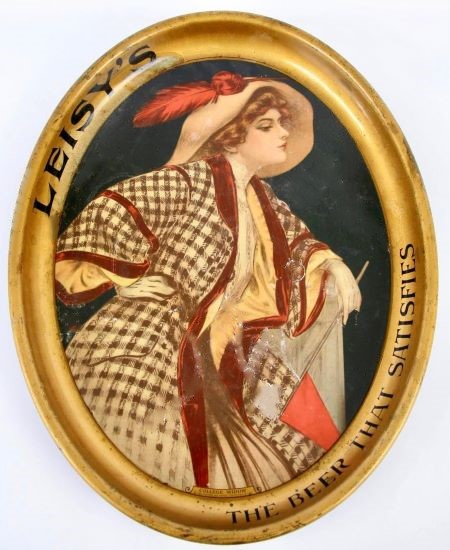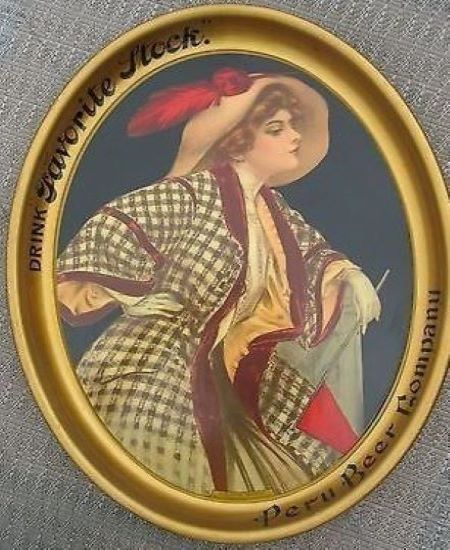The 'Stock' Exchange
American Art Works: No. 135 "College Widow"
American Art Works: No. 135 "College Widow"
Date: 1913 to 1918
Size: 12.75" x 16.25"
Type: Pie
Scarcity: Uncommon
Value: $$$ to $$$$
Condition & Brewer Dependent
Size: 12.75" x 16.25"
Type: Pie
Scarcity: Uncommon
Value: $$$ to $$$$
Condition & Brewer Dependent


General
It’s long been an adage that “sex sells” and while incredibly tame by today’s standards that’s essentially what all those “pretty lady” stock designs were about. They were subtle and genteel. Initially “The College Widow” seems to be more so than most; there is no bare skin showing like so many of the others, just a stylishly dressed young woman who appears to be attending a college sporting event. But it is the idea of what she represents that is somewhat shocking to find in a design from American Art Works and that idea is sex. Not some vague idealized version of sex, but carnal sex for pleasures sake.
We have to admit that we were completely unfamiliar with what turns out to be a well-known early 20th century trope in the literary world. Research indicates that in large part, very few people today are familiar with this particular trope because the circumstances and context in which it existed have pretty much disappeared, although the idea behind the trope continues on in a different form. In the Marx Brothers classic Horse Feathers—many a modern viewer’s only exposure to the trope—the college widow is just sort of there, without explanation.
In the latter nineteenth and early twentieth centuries, the trope of a "college widow" was practically de rigueur in any discussion of campus life, usually meaning an attractive unmarried woman near campus who would date college students, moving on to new students as the years passed. Less flattering assessments would paint her as a “sexually predatory vamp.” By dating men in successive senior classes but never marrying, she was subsequently “widowed” with each passing graduation. In some cases, these characters were portrayed as literal widows - the younger wife of a deceased faculty member or college president, but more often, the term seems to have applied to a townie or graduate who is just hanging around but barely older than the students she courts. Such a women would have known the marriage bed and were hungry for young collegiate sexual partners. We have to remember that most all colleges and universities at that time were all male institutions. A popular prewar ditty “Mimi the College Widow” put it this way:
Pride of the university
Mimi the college widow
She taught the boys anatomy.
Mimi the college widow,
To know her is to love her, it’s sure.
She laid the cornerstone of knowledge,
Also the whole damn college,
She’s Mimi the college … widow.
Among the earlier works to make the trope central to the story was George Ade’s play The College Widow which is set against the backdrop of a college football rivalry between fictional Atwater College and nearby Bingham College (apparently loosely based on the real-life rivalry between DePauw University and Wabash College. The “college widow” is Jane Witherspoon the daughter of Atwater college’s president, and she works to prevent star football player Billy Bolton (Frederick Truesdell) from attending rival Bingham College.
It’s long been an adage that “sex sells” and while incredibly tame by today’s standards that’s essentially what all those “pretty lady” stock designs were about. They were subtle and genteel. Initially “The College Widow” seems to be more so than most; there is no bare skin showing like so many of the others, just a stylishly dressed young woman who appears to be attending a college sporting event. But it is the idea of what she represents that is somewhat shocking to find in a design from American Art Works and that idea is sex. Not some vague idealized version of sex, but carnal sex for pleasures sake.
We have to admit that we were completely unfamiliar with what turns out to be a well-known early 20th century trope in the literary world. Research indicates that in large part, very few people today are familiar with this particular trope because the circumstances and context in which it existed have pretty much disappeared, although the idea behind the trope continues on in a different form. In the Marx Brothers classic Horse Feathers—many a modern viewer’s only exposure to the trope—the college widow is just sort of there, without explanation.
In the latter nineteenth and early twentieth centuries, the trope of a "college widow" was practically de rigueur in any discussion of campus life, usually meaning an attractive unmarried woman near campus who would date college students, moving on to new students as the years passed. Less flattering assessments would paint her as a “sexually predatory vamp.” By dating men in successive senior classes but never marrying, she was subsequently “widowed” with each passing graduation. In some cases, these characters were portrayed as literal widows - the younger wife of a deceased faculty member or college president, but more often, the term seems to have applied to a townie or graduate who is just hanging around but barely older than the students she courts. Such a women would have known the marriage bed and were hungry for young collegiate sexual partners. We have to remember that most all colleges and universities at that time were all male institutions. A popular prewar ditty “Mimi the College Widow” put it this way:
Pride of the university
Mimi the college widow
She taught the boys anatomy.
Mimi the college widow,
To know her is to love her, it’s sure.
She laid the cornerstone of knowledge,
Also the whole damn college,
She’s Mimi the college … widow.
Among the earlier works to make the trope central to the story was George Ade’s play The College Widow which is set against the backdrop of a college football rivalry between fictional Atwater College and nearby Bingham College (apparently loosely based on the real-life rivalry between DePauw University and Wabash College. The “college widow” is Jane Witherspoon the daughter of Atwater college’s president, and she works to prevent star football player Billy Bolton (Frederick Truesdell) from attending rival Bingham College.
Confirmed Brewer used Stock Trays
Non-Beer Related & Non-Tray Uses
There was a 1915 silent film (which has since been lost) and then another in 1927, both by the name The College Widow; in the 1927 version Jane Witherspoon is played by Dorothy Costello, Drew Barrymore’s grandmother. Later adaptions include Maybe It's Love (1930) and Freshman Love (1936). It turns out that the Marx Brother’s movie Horse Feathers was in fact a parody of the play (and subsequent 1927 film). So why was this trope so prevalent? One early movie critic’s theory:
“Filmmakers had to assure us that our heroes were healthy, red-blooded American men, who would never resort to all that Brideshead Revisited stuff that was rumored to go on at many an all-male campus. Obviously in the 1910s–1940s (the heyday of this trope), prostitution couldn’t be depicted on screen, so our protagonists couldn’t get their kicks that way. Once the Hays Code came into effect, adulterers must be punished. And for a hero to seduce an unmarried young woman would be caddish. So the college widow served as an effective outlet for all of our heroes’ wants and needs (and those of the writer): it proved the protagonist was straight, sexually desirous and desirable, and yet still a gentleman.”
The trope died out as colleges starting opening doors to women thus rendering the “the college widow” obsolete and to be replaced with co-eds who seduced young men in hopes of leaving college with their “MRS” degree. Or older women like Dean Wormer’s wife in Animal House who are neglected by their husbands and seek sexual gratification with college students.
And that is why this design is the most provocative of the entire catalog as surely most prospective buyers would be aware. Needless to say, the design was most popular with brewers and liquor-related firms.
There is no Sahling entry for this design, nor have we seen a version with an artist’s signature.
Size, Shape & Advertising Placement
Every tray example of this design that we have seen is the new, narrower oval style with steep rims. We have seen a single example of a tin-over-cardboard sign (WWW Rings) and an unmarked curled corner sign. Most trays have black rims with gold advertising text; alternatively, there are a few examples with gold rims and black text.
Hager & Price
This is not a design that Hager discusses but he does include it in both his date of introduction table (1913) and his catalog. Most average or better condition examples, for both brewers and non-brewers, pretty consistently reach low to mid three figures with only the poorer condition examples falling into double digits. Very good to excellent condition examples from Spokane Brewing & Malting and Peru Beer Co have reached low four figures.
“Filmmakers had to assure us that our heroes were healthy, red-blooded American men, who would never resort to all that Brideshead Revisited stuff that was rumored to go on at many an all-male campus. Obviously in the 1910s–1940s (the heyday of this trope), prostitution couldn’t be depicted on screen, so our protagonists couldn’t get their kicks that way. Once the Hays Code came into effect, adulterers must be punished. And for a hero to seduce an unmarried young woman would be caddish. So the college widow served as an effective outlet for all of our heroes’ wants and needs (and those of the writer): it proved the protagonist was straight, sexually desirous and desirable, and yet still a gentleman.”
The trope died out as colleges starting opening doors to women thus rendering the “the college widow” obsolete and to be replaced with co-eds who seduced young men in hopes of leaving college with their “MRS” degree. Or older women like Dean Wormer’s wife in Animal House who are neglected by their husbands and seek sexual gratification with college students.
And that is why this design is the most provocative of the entire catalog as surely most prospective buyers would be aware. Needless to say, the design was most popular with brewers and liquor-related firms.
There is no Sahling entry for this design, nor have we seen a version with an artist’s signature.
Size, Shape & Advertising Placement
Every tray example of this design that we have seen is the new, narrower oval style with steep rims. We have seen a single example of a tin-over-cardboard sign (WWW Rings) and an unmarked curled corner sign. Most trays have black rims with gold advertising text; alternatively, there are a few examples with gold rims and black text.
Hager & Price
This is not a design that Hager discusses but he does include it in both his date of introduction table (1913) and his catalog. Most average or better condition examples, for both brewers and non-brewers, pretty consistently reach low to mid three figures with only the poorer condition examples falling into double digits. Very good to excellent condition examples from Spokane Brewing & Malting and Peru Beer Co have reached low four figures.
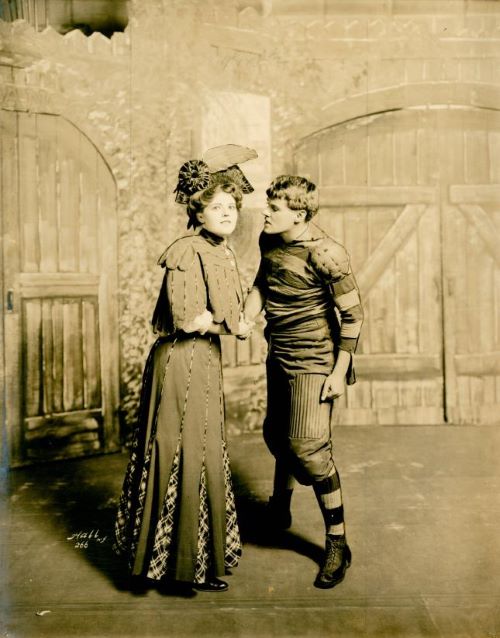
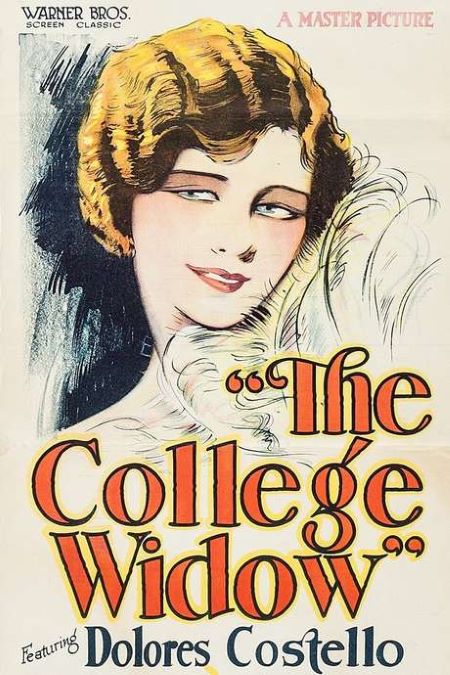
Click the Picture to Return to Meek & Beach Stock Catalog Page

